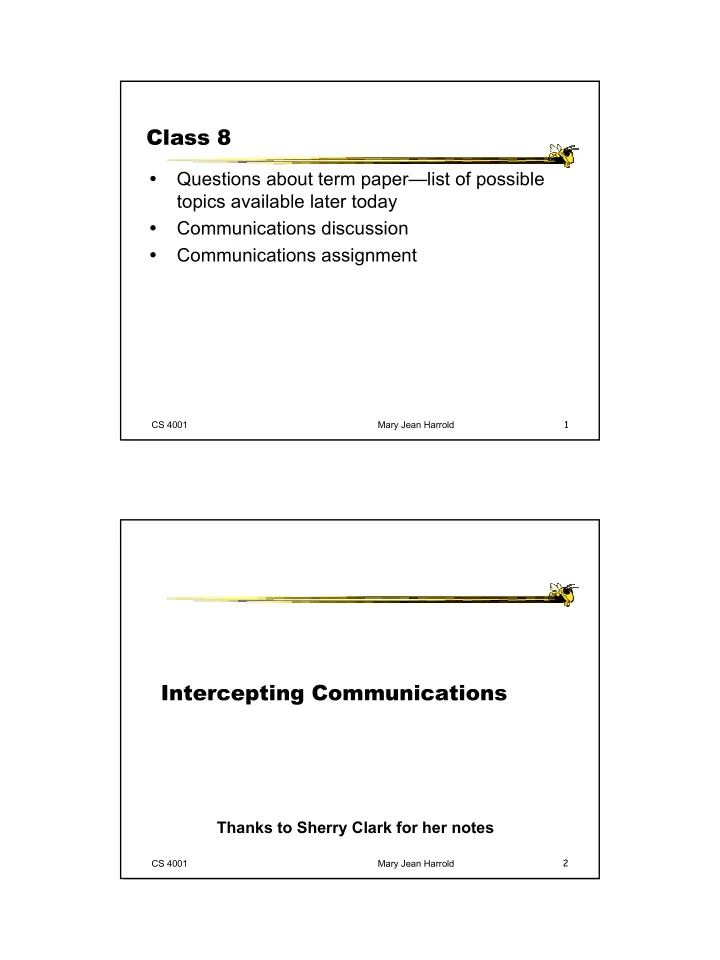

Class 8 � Questions about term paper—list of possible topics available later today � Communications discussion � Communications assignment 1 CS 4001 Mary Jean Harrold Intercepting Communications Thanks to Sherry Clark for her notes 2 CS 4001 Mary Jean Harrold 1
Outline � Overview of the Controversies � Intercepting Communications � Cryptography and Its Uses � Encryption Policy: Access to Software, Keys, and Plaintext � Fundamental Issues 3 CS 4001 Mary Jean Harrold Overview of Controversies � Communications Privacy Affected by � Interception of communications, including: � Telephone, E-mail, and Web activity. � Restrictions on secure encryption. � Exportation of strong encryption was viewed as a threat to national security. � CALEA (Communications Assistance for Law Enforcement Act. � Communications technology must assist law enforcement, not hinder. � Global surveillance systems. � The constitutionality of domestic systems and the necessity of international systems are under question. 4 CS 4001 Mary Jean Harrold 2
Intercepting Communications (1) � Wiretapping � Telephone: � Pre-1934: used widely by government, businesses, and private sector. � 1934: the Federal Communications Act disallowed unauthorized wiretaps; many ignored the law. � 1968: the Omnibus Crime Control and Safe Streets Act restricted wiretapping by requiring a court order. Q: Can law enforcement intercept communications without a court order? 5 CS 4001 Mary Jean Harrold Intercepting Communications (2) � Wiretapping � New Technologies: � 1986: Electronic Communications Privacy Act (ECPA) and its amendments restricted government interception of e-mail, cell-phones, etc. � 2001: USA Patriot Act loosened restrictions on government wiretapping and communications interception. Q : Does the USA Patriot Act supersede ECPAs restrictions? 6 CS 4001 Mary Jean Harrold 3
Intercepting Communications (3) � Designing Communications Systems for Interception and Tracking � Obstacles to interception: � Incomplete pen-registers as a result of long distance service. � Packet-mode communications (e-mail, file transfers, Internet phones). � Solutions: � CALEA: Requires telecommunications equipment be designed to ensure interception by law enforcement (with court order). Q : Why did privacy advocates object to CALEA? 7 CS 4001 Mary Jean Harrold Intercepting Communications (4) � Designing Communications Systems for Interception and Tracking (cont’d) � CALEA � Costs include modified hardware, software, and overuse by authorities. � Wiretappable systems vulnerable to criminal hacking, industrial spies, etc.. � Competition weakened due to restricted changes and diversities. � Civil liberties threatened by nationwide standard for surveillance. Q: CALEA allows for the interception of PINs. Do you support this use? 8 CS 4001 Mary Jean Harrold 4
Intercepting Communications (5) � Carnivore � FBI’s system to intercept e-mail with a court order. � Pro: Law enforcement needs this tool to fight crime. � Con: All e-mail goes through FBI’s Carnivore system. Q : Does Carnivore violate the 4 th Amendment? 9 CS 4001 Mary Jean Harrold Intercepting Communications (6) � NSA and Echelon � NSA (National Security Agency): � Collects and analyzes communications to find threats to national security. � Echelon: � Member nations intercept communications for each other. Q : Should the NSA be permitted to intercept all e-mail entering and leaving the U.S.? 10 CS 4001 Mary Jean Harrold 5
Communications Assignment � Discuss and work on in groups of 2-3 11 CS 4001 Mary Jean Harrold 6
Recommend
More recommend